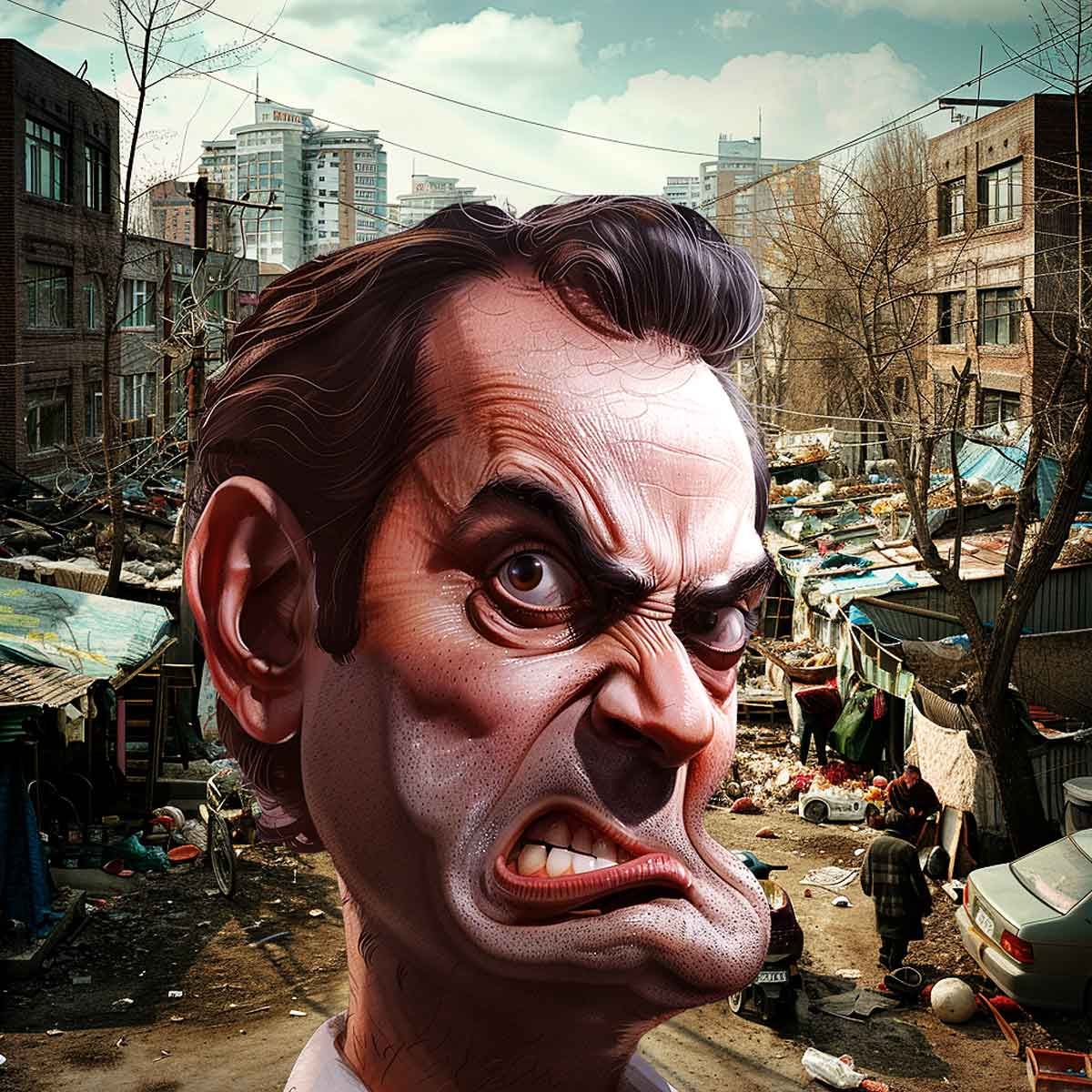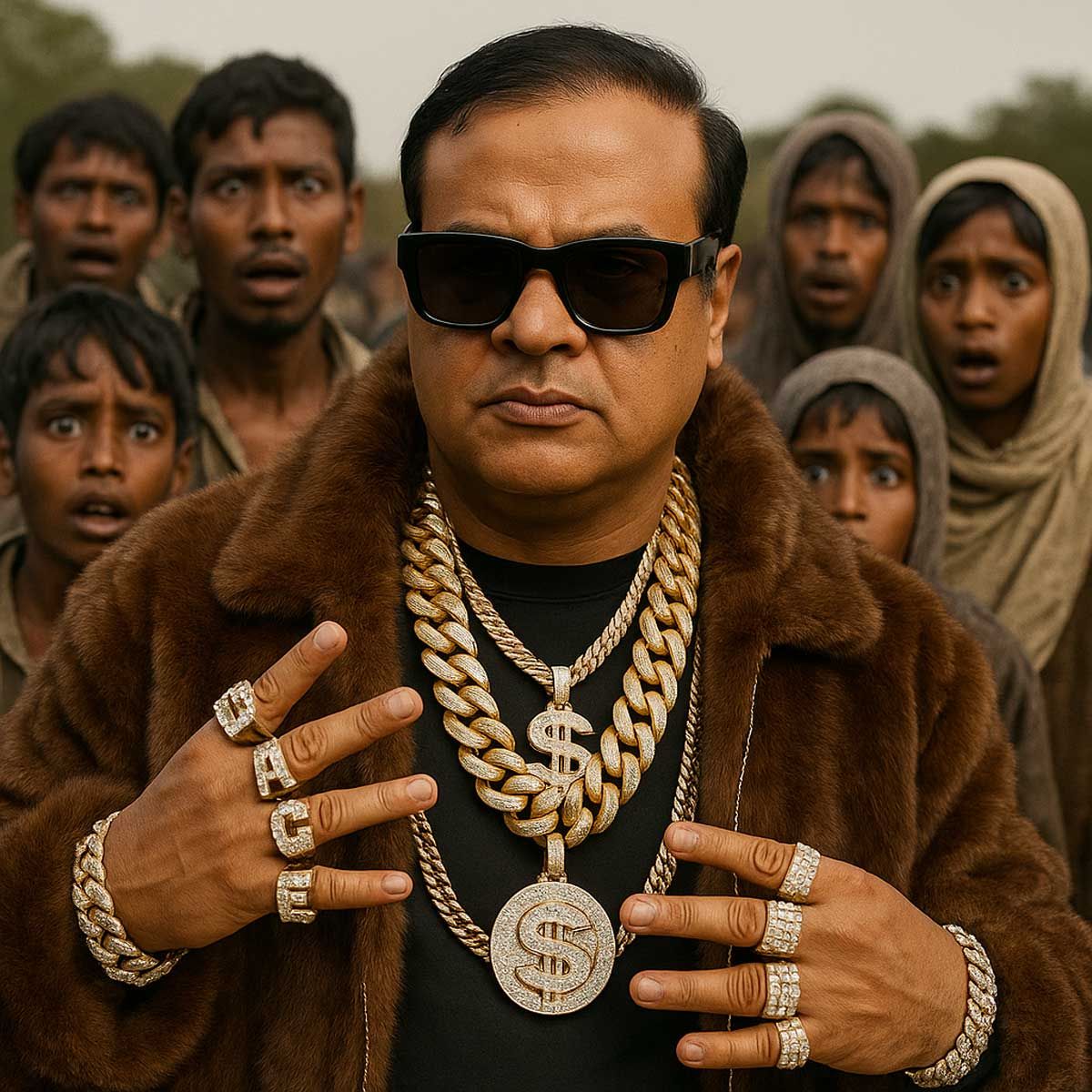More Coverage
Twitter Coverage
Satyaagrah
Written on
Satyaagrah
Written on
Satyaagrah
Written on
Satyaagrah
Written on
Satyaagrah
Written on
JOIN SATYAAGRAH SOCIAL MEDIA
"मियाँ पप्पू": Rajiv Gandhi abolished India's 3-decade-old inheritance tax right before the transfer of Indira's estate to her grandchildren; Rahul Gandhi now proposes reintroducing wealth redistribution, a strategy historically proven to fail globally

Sam Pitroda, the Chairman of the Indian Overseas Congress and advisor to Rahul Gandhi, recently reignited a contentious political debate by suggesting that India adopt an inheritance tax similar to that of the United States to help redistribute wealth. According to Pitroda, this tax regime would allow the government to take more than half of a citizen's wealth upon their death, leaving only the remainder for their grieving family members.
|
Prime Minister Narendra Modi responded strongly to Pitroda's proposal, accusing the Congress party of consistently overloading Indians with heavy taxes and engaging in widespread corruption. He declared that the Congress party's true motto seems to be "Congress ki loot, Zindagi ke sath bhi, Zindagi ke bad bhi," implying that the party exploits citizens both in life and after death. This severe backlash led to Pitroda and the Congress party quickly distancing themselves from the controversial tax proposal.
It's important to note that this isn't the first time the concept of an inheritance tax has been proposed by Congress. Such a tax was enforced under the Estate Duty Act of 1953 and lasted for more than three decades. This law taxed the inheritance of property at rates that could reach as high as 85% of the property's value, particularly for estates valued over ₹20 lakh. The structure of this tax featured progressive slabs similar to the current income tax system, where higher property values faced higher tax rates. For the most valuable properties, this meant that the government could claim nearly all of a property's value upon the owner's death, significantly impacting the inheritance passed down to their heirs.
The Estate Duty Act of 1953, which aimed to tax the inheritance of property, did not function as the government had initially hoped. One significant issue was the concept of double taxation. Assets were taxed twice: firstly, through the wealth tax during the owner's lifetime—a tax that was later abolished by the Modi government starting in the fiscal year 2016—and secondly, through the estate duty after the owner's death. Furthermore, the revenue generated from the estate duty was much lower than expected, primarily due to widespread concealment of assets and the ownership of properties under fictitious names, known as benami properties.
The act was repealed in 1985 by the government led by Prime Minister Rajiv Gandhi. The timing of this repeal is particularly noteworthy. It occurred just weeks before the will of former Prime Minister Indira Gandhi was executed, which involved the transfer of her properties to her grandchildren.
This repeal took place in the first budget presented by Rajiv Gandhi's government, with VP Singh serving as the Finance Minister. Officially, the Estate Duty Act was abolished effective from April 1, 1984. Intriguingly, just a month after this date, on May 2, 1984, Indira Gandhi’s will was made public. According to the will, her estate, valued at approximately $175,000 (over ₹21.50 lakh at that time), was bequeathed to her three grandchildren, Rahul Gandhi, Priyanka Gandhi, and Varun Gandhi. Today, the value of this estate would exceed ₹4.2 crore.
According to a report by United Press International (UPI) dated May 2, 1985, Indira Gandhi's will was a carefully thought-out document that designated her son Rajiv Gandhi and his wife Sonia Gandhi as the executors. Interestingly, the will, signed in 1981, did not allocate any part of her estate to them directly. Additionally, nothing was left to her estranged daughter-in-law, Menaka Gandhi. This will was officially brought to public attention when Rajiv Gandhi submitted it for certification in a court.
The primary assets detailed in Indira Gandhi’s will included a substantial property consisting of a farm and an under-construction farmhouse located in Mehrauli, valued at $98,000. This property was to be evenly distributed among her three grandchildren—Rahul, Priyanka, and Varun Gandhi. Besides the real estate, the grandchildren were bequeathed approximately $75,000 in cash, stocks, and bonds. They also received copyrights to books authored by Indira Gandhi herself and her father, Jawaharlal Nehru. Exclusively to Priyanka Gandhi, Indira Gandhi left antique articles and personal jewelry, estimated to be worth around $2,500.
|
At the time of Indira Gandhi’s passing, all three beneficiaries were minors. Consequently, the responsibility of managing the inheritance until they reached adulthood was given to Rajiv and Sonia Gandhi.
While India had enforced an inheritance tax for more than three decades, the Gandhi grandchildren—Rahul, Priyanka, and Varun—did not have to face any tax liabilities on their inherited assets from Indira Gandhi. This was due to the strategic timing of the abolition of the inheritance tax. The tax regime was repealed just a month before the execution of Indira Gandhi's will.
The will itself was made public on May 2, 1985, aligning closely with the government's financial legislation changes. Specifically, under a finance bill enacted on April 1, 1985, all death duties, including inheritance tax, were eliminated. This legislative change was highlighted in a UPI report from the same day, which explicitly stated, “Under a finance bill that took effect April 1, all death duties in India have been abolished and no inheritance tax will be assessed on the Gandhi estate.” As a result, when the will was executed shortly thereafter, no inheritance tax was imposed on the estate that was passed down to Indira Gandhi’s grandchildren.
|
Wealth Redistribution: Rahul Gandhi Wants to Make India the Lab Rat for an Idea That Has Already Failed All Over the World
On April 6th, Rahul Gandhi, the Congress leader and possible prime ministerial candidate for the I.N.D.I. Alliance in the upcoming 2024 Lok Sabha elections, proposed a radical approach to tackling poverty and socioeconomic inequality through 'wealth redistribution'. Gandhi stated that if his party, along with its alliance partners, were to come into power, they would undertake a comprehensive financial and institutional survey to identify the wealth holders in the country. Based on this data, the Congress party plans to redistribute this wealth to the backward castes and 'minorities', using population figures derived from caste census data.
While this proposal might sound unfeasible to some, it is not the first time such an idea has been floated in India. During the COVID-19 pandemic, social activist Yogendra Yadav proposed a similar strategy under the action plan "Mission Jai Hind".
Wealth redistribution is often associated with communist and socialist ideologies and has been attempted in various forms around the world. Although initially appealing as a solution to economic disparities, history shows that such policies have often led to severe economic downturns. In many cases, these attempts have put countries in precarious situations, from which recovery was daunting, if not impossible.
Proponents of wealth redistribution argue that it serves to correct economic imbalances and promotes social justice. Despite these intentions, globally, such policies have consistently fallen short of achieving their stated goals, leading to widespread criticism and reevaluation of their effectiveness.
The Soviet Union Collapse
One of the most notorious failures of wealth redistribution took place after the Bolshevik Revolution in 1917, which significantly shaped the economic landscape of the Soviet Union. The new Soviet government embarked on an ambitious program to redistribute wealth and resources. It seized private properties, nationalizing them, and placed industries under state control.
These drastic policies quickly led to widespread inefficiencies across various sectors. Shortages became commonplace, and the overall economy entered a state of stagnation. Critics of wealth redistribution often overlook or deliberately ignore that the success of businesses is not solely due to favorable policies. Businesses thrive for a multitude of reasons, including management expertise, product innovation, and market demand.
As the Soviet Union continued to enforce these policies, its economy showed little capacity for innovation and struggled to adapt to changing market conditions. The availability of consumer goods dwindled, leading to a sharp decline in the standard of living. By 1991, these accumulated issues contributed to the ultimate collapse of the Soviet Union. This historical example highlights that not everyone has the necessary skills or inclination to run businesses effectively, especially when resources are distributed without considering the recipients' business acumen or motivation.
The Mao Disaster in China
Mao Zedong's tenure in China is marked by his attempts at wealth redistribution through programs like the Great Leap Forward and the Cultural Revolution. These initiatives aimed to collectivize agriculture and modernize the economy through centralized planning. However, Mao's policies turned out to be catastrophic, causing widespread famine, economic turmoil, and social unrest. The impact was devastating: millions of people died from starvation, and China experienced a significant economic downturn. It was not until after Mao's death that Deng Xiaoping introduced economic reforms, steering China towards recovery and significant economic growth and development.
The Untimely ‘Demise’ of Venezuela’s Wealth Bubble
In the West, Latin American countries such as Venezuela also experimented with wealth redistribution, which ended in failure. Leaders like Hugo Chavez and his successor, Nicolas Maduro, implemented socialist policies aimed at redistributing wealth and nationalizing key industries. Unfortunately, these efforts were undermined by corruption and mismanagement. Additionally, a collapse in oil prices exacerbated the country's economic problems. As a result, Venezuela plunged into a severe economic crisis characterized by hyperinflation, a dramatic decline in the value of the currency, and shortages of essential goods. This dire situation forced millions to leave Venezuela in search of better opportunities abroad, resulting in mass migration.
The Zimbabwean Catastrophe
Under the leadership of Robert Mugabe, Zimbabwe provides yet another example of the pitfalls of wealth redistribution. Mugabe's government aggressively pursued a land redistribution policy aimed at transferring land from white farmers to black Zimbabweans. The manner in which this redistribution was conducted, however, spurred violence and led to significant economic instability. As a result, Zimbabwe, once a major supplier of food grains to the entire continent of Africa, saw its agricultural productivity collapse. This drastic decline precipitated widespread food shortages and a severe economic downturn across the country.
These examples from various parts of the world consistently show that wealth redistribution policies have generally exacerbated problems rather than solving them. The reasons for these failures are complex and multifaceted. They typically involve a combination of irresponsible centralized planning, a lack of incentives for innovation and productivity, prevalent corruption, and oppressive political measures. Each of these factors has contributed to the undermining of economies where wealth redistribution was attempted, leading to disastrous outcomes.
Not Everyone Can Manage Wealth
What exactly is the purpose of wealth redistribution? Is it to enable marginalized individuals to start their own businesses, or to provide funds to those who have never had enough money to buy basic appliances like a refrigerator? There is a common argument against redistributing money from those who have accumulated it to those who are less fortunate. Many believe that there are existing government schemes designed to assist the marginalized, making radical redistribution unnecessary.
In India, for instance, the business landscape provides clear examples of how personal capabilities and resources determine success. While one businessman may fail due to a lack of vision or skills, another may succeed spectacularly using the same set of circumstances but with better management and innovative strategies. It is evident that not everyone has the aptitude to be a successful businessman, manage finances effectively, or excel as a skilled or unskilled worker.
The impact of interfering with societal functions on a personal level can often be detrimental. For example, if an individual without business acumen receives unconditional financial support, they might spend it inefficiently, such as investing in ineffective advertising that leads to no new business. In contrast, a skilled entrepreneur could leverage social media platforms to promote their business at minimal cost, achieving much greater returns. This disparity highlights that the effectiveness of wealth distribution depends heavily on the recipient's ability to utilize the resources wisely. Such examples underscore the complex nature of wealth management and suggest that not everyone is equipped to handle sudden financial gain effectively.
The Case of the Ambani Brothers
The story of the Ambani brothers in India illustrates a key point about wealth management and the challenges of business. When the vast business empire of their father was divided, Anil Ambani initially received parts of the business that seemed very promising. However, a series of poor business decisions over time led to significant financial struggles for him, and today, he is far less prominent in the business world. In contrast, his elder brother, Mukesh Ambani, has flourished, significantly multiplying his wealth and expanding his influence in the global market.
This disparity between the two brothers' fortunes highlights a crucial aspect of wealth redistribution: the transfer of wealth and resources from those who have demonstrated expertise in managing them to those who may lack the necessary skills or knowledge. Not everyone has the ability to run a successful business or manage a factory effectively. The example of Anil Ambani shows that even with a promising start and apparent leadership skills, successful business management requires more than just initial resources—it demands continuous smart decision-making and adaptability.
The debate over wealth and resource redistribution often centers on the idea that it would strip experts of their assets and hand them over to individuals who may not be equipped to use them effectively. Such a shift could potentially lead to inefficiencies and failures, similar to what happened with some of Anil Ambani's ventures. The principle here is that not everyone is cut out to run a factory or a large business, and recognizing this is crucial for economic stability and growth.
History Teaches Us to Repel Wealth Distribution
Historical evidence consistently reveals that the concept of wealth redistribution is fundamentally flawed and should be resisted. This idea, deeply rooted in extreme Communist ideology, was famously encapsulated by Karl Marx in his Communist Manifesto. Marx advocated for wealth to be distributed based on the principle, "From each according to his ability, to each according to his need." While Marx has been revered by Communists, the practical application of his theories has been catastrophic, leading to millions of deaths worldwide.
Governments or leaders genuinely committed to reducing economic inequality should focus on sustainable and inclusive economic strategies rather than on wealth redistribution. The emphasis should be on fostering innovation, entrepreneurship, and individual freedoms. These elements are essential for creating a thriving economy and society. Encouraging personal initiative and rewarding innovation are far more effective in the long term for eradicating poverty and improving societal welfare. History has shown that alternative approaches, particularly those involving forced redistribution, do not yield positive outcomes and often result in significant harm and economic decline.
 Support Us
Support Us
Satyagraha was born from the heart of our land, with an undying aim to unveil the true essence of Bharat. It seeks to illuminate the hidden tales of our valiant freedom fighters and the rich chronicles that haven't yet sung their complete melody in the mainstream.
While platforms like NDTV and 'The Wire' effortlessly garner funds under the banner of safeguarding democracy, we at Satyagraha walk a different path. Our strength and resonance come from you. In this journey to weave a stronger Bharat, every little contribution amplifies our voice. Let's come together, contribute as you can, and champion the true spirit of our nation.
 |  |  |
| ICICI Bank of Satyaagrah | Razorpay Bank of Satyaagrah | PayPal Bank of Satyaagrah - For International Payments |
If all above doesn't work, then try the LINK below:
Please share the article on other platforms
DISCLAIMER: The author is solely responsible for the views expressed in this article. The author carries the responsibility for citing and/or licensing of images utilized within the text. The website also frequently uses non-commercial images for representational purposes only in line with the article. We are not responsible for the authenticity of such images. If some images have a copyright issue, we request the person/entity to contact us at This email address is being protected from spambots. You need JavaScript enabled to view it. and we will take the necessary actions to resolve the issue.
Related Articles
- ‘Bapu tum vapas aa jao bapu, boo hoo hoo’: Gandhi Jayanti is incomplete without these videos of SP leaders with extravagant tear fest, brings back memories of Congress leaders doing the same
- New York Times seems to be the favorite source of information for Rahul Gandhi and the Congress party for developing twisted narratives and targeting the Modi government on Pegasus yet again: How they are wrong
- "बने चाहे दुश्मन ज़माना हमारा": US diplomats engage with Indian opposition leaders like Kharge, Owaisi and Omar Abdullah, raising alarms of interference similar to political dynamics in Bangladesh, as Jammu and Kashmir braces for pivotal Assembly Elections
- In yet, another attempt to malign Hindutva Rahul Gandhi makes a mockery of himself by sharing a video of friendly banter between an uncle-nephew duo
- From delivering sinister anti-Hindu speech at book launch, bunch of lies, and of course Hindumisia Rahul Gandhi went on to incite people to retaliatory violence: Repeatedly using the term ‘kutte jaise maara’ in an attempt to provoke sentiments
- Muslim cleric Syed Naseruddin Chishty strongly refutes Rahul Gandhi's claim that 'Abhaya Mudra' is present in Islam, emphasizing the absence of any tradition of idol worship or mudras in Islam, urging Gandhi to correct his parliamentary statement
- CPI-turned-Congress leader Kanhaiya Kumar welcomed inside Congress party office in Lucknow with Ink thrown on his face and slogan of 'Kanhaiya Kumar Murdabad', party leaders claim it was ‘acid’: Uttar Pradesh
- Rahul Gandhi's 'Dancing Aishwarya Rai' remark, intended as media critique, backfires, revealing his bias against independent women, revealing a deep-seated disdain for those who dare to navigate outside his conventional political and ideological lanes
- "A man's most open actions have a secret side to them": Regime Change Operation - Rahul Gandhi went to White House in secret meetings that were kept under wraps, also met Donald Lu, Assistant Secretary of State for South Asia in the State Department
- Union Minister G Kishan Reddy hit out at the Gandhi-scion for challenging India’s national unity by referring it to as a “union of states” and not a nation, cites speeches by Dr. Ambedkar
- Manmohan Singh govt was ready to demilitarise the Siachen glacier and cede the control to Pakistan under the pressure of Americans, wanted to call it ‘Mountain of Peace’: Former Chief of Army Staff General JJ Singh
- Same Congress which is offering freebies in the states during polls has not paid rent for Lutyens Delhi bungalows for almost a decade, Rent worth crores pending: RTI revelation
- "Poor thing": Sonia Gandhi's remark that President Murmu was 'tired' sparked outrage; BJP demanded apology, while PM Modi praised Murmu's vision with self-reliant defence, Kashmir-Kanyakumari rail, and a 1,000 km metro milestone
- "Who gifted 163-acre Katchatheevu Island to Sri Lanka as a gift, wasn’t that part of Maa Bharati there," PM Narendra Modi tore Congress while replying at the No-Confidence Motion, highlighting DMK and CM Stalin consistent pleas urging its retrieval
- Rahul Gandhi schooled by Externals Affair Minister Dr. S Jaishankar of history lessons and is condemned by Law Minister Kiren Rijiju for his remarks on the judiciary and Election Commission





























